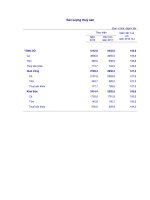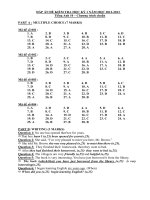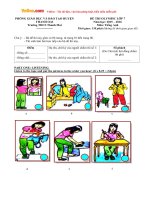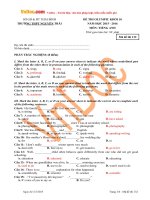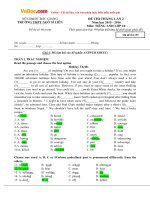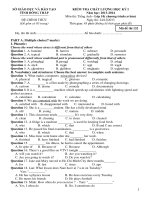Đề thi Olympic môn Tiếng Anh lớp 10 tỉnh Đăk Nông năm 2015
Bạn đang xem bản rút gọn của tài liệu. Xem và tải ngay bản đầy đủ của tài liệu tại đây (290.67 KB, 13 trang )
SỞ GIÁO DỤC VÀ ĐÀO TẠO
KỲ THI OLYMPIC CẤP TỈNH
TỈNH ĐĂK NÔNG
Khóa ngày 14 tháng 3 năm 2015
ĐỀ THI CHÍNH THỨC
MÔN THI: TIẾNG ANH 10
Thời gian: 180 phút (Không kể thời gian giao đề)
A. MULTIPLE CHOICE (40 PTS)
I. PHONOLOGY: (5PTS)
Choose the word which has the underlined part pronounced differently from the rest.
1. A. poor
B. moor
C. door
D. boor
2. A. embassy
B. chamber
C. banyan
D. climbing
3. A. stronger
B. singer
C. finger
D. longer
4. A. folk
B. milk
C. walk
D. half
5. A. occasion
B. television
C. dimension
D. invasion
Choose one word whose stress pattern is different. Identify your answer by circling the corresponding
letter A, B, C, or D.
6. A. colonialist
B. bargain
C. financial
D. peculiar
7. A. organism
B. mischievous
C. supportive
D. metaphor
8. A . maintain
B. infamous
C. determine
D. develop
9. A. mysterious
B. preferential
C. modernity
D. historical
10. A. automatic
B. conversation
C. disadvantage
D. reasonable
ll. VOCABULARY (5PTS)
Choose the best answer that best completes each sentence:
11. A child’s mind is like a …….. .
A. fresh book
B. blank sheet
C. white paper
D. new leaf
12. Colin was so ................. because of his exam that he could not sit still for five minutes.
A. on the verge
B. on edge
C. on border
D. on rim
13. She …………….. for olives during her holiday in Greece.
A. acquired a taste
B. came of age
C. gave a full
D. plant a bug
14. They got married without their parents' ………………
A. agreement
B. allowance
C. consent
D. permit
15. Many college students are attracted to the..........life of a journalist; the prospect of exploring the
world is very appealing.
A. peripatetic
B. conventional
C. remunerative
1
D. coordinated
16. Do you think paparazzi's taking photos of celebrities is an ………….. of privacy?
A. attack
B. invasion
C. intervention
D. offence
17. The driver's charge was finally reduced to …. because he hadn't killed the girl deliberately.
A. homicide
B. murder
C. killing
D. manslaughter
18. I'm sorry that looks awful. Those two colors …………..
A. crash
B. smash
C. clash
D. hash
19. Since Rooney was offside. His goal was ……….…
A. disallowed
B. disagreed
C. refused
D. denied
20. After arriving late for the third time in one week, Sam was finally given the …………… slip.
A. red
B. black
C. yellow
D. pink
III. STRUCTURES AND GRAMMAR (5PTS)
Choose the best option to complete the following sentences :
21. He said that the plane had already left and that I … arrived an hour earlier.
A. must have
B. had to
C. should have
D. was supposed to
22. The front door is warped from the humidity. We have a difficult time ……….… it.
A. for opening
B. opening
C. having opened
D. to open
23. Your ideas, …….. …, seem unusual to me.
A. as hers
B. like hers
C. similar as hers
D. different than hers
24. ………… appears considerably larger at the horizon than it does overhead is merely an optical
illusion.
A. The moon
B. That the moon
C. When the moon
D. The moon which
25. Mrs. Lincon has …………… that she is unable to get a job.
A. such small education
B. so little education
C. a such little education
D. a so small education
26. ………… his advice, I would never have got a job.
A. Except
B. But for
C. Apart from
D. As for
27. ………… the phone rang later that night did Ann remember the appointment.
A. No sooner
B. Only
C. Not until
D. Just before
28. She demanded that she ……….. allowed to meet her son in prison.
A. was
B. might be
C. be
D. could be
29. ……….., he felt so unhappy and lonely.
A. In spite of his being wealth
B. Rich as was he
C. Rich as he was
D. Despite his wealthy
30. If you hadn’t taken the money, you ……………. in prison now.
A. wouldn’t have been B. wouldn’t be
C. hadn’t been
2
D. haven’t been
IV. PHRASAL VERBS AND PREPOSITIONS (5PTS)
Choose the best answer that best completes each sentence:
31. A general amnesty for political prisoners may be …….… the offing.
A. on
B. at
C. in
D. through
32. Thomas is always flying ……..… the handle at the slightest thing.
A. off
B. over
C. around
D. through
33. Gareth Bale is a brilliant young footballer who is ………… the up and up.
A. in
B. to
C. through
D. on
34. No agreement was reached. The strikers decided to ……… out for a better deal.
A. keep
B. watch
C. hold
D. draw
35. That dietician is going to bring … a book on healthy eating next month
A. on
B. up
C. forward
D. out
36. He ………. up a lot of debts in the town and then disappeared without a trace.
A. put
B. ran
C. brought
D. made
37. She got a bit hot ……… the collar when a colleague started criticizing her work.
A. under
B. on
C. beyond
D. from
38. Although the antique table looked nice from across the room, ……… close quarters you could see
how badly damaged it was.
A. in
B. on
C. to
D. at
39. The press thought the football manager would be depressed by his dismissal but he just ……
A. ran it down
B. brought it off
C. turned it down
D. laughed it off
40. If the rain doesn’t …….… soon, we shall have to look for a taxi.
A. turn in
B. let up
C. die down
D. go off
V. GUIDED CLOZE TEST (10PTS)
CLOZE TEST 1
Read the passage and choose the best answer:
The quality of life these days is something most of us take for (41)…….. . It takes some radically
different experience to (42)…… this fact home to people. In my (43)……., it was spending three weeks
aboard a yacht with twelve other people, competing in a major sailing race. (44)……… I was officially a
guest, it was (45) ………. clear to me from the start that there was to be no room for passengers, and that
I'd have to (46) …..… my weight.
For the first few nights, none of us was able to sleep for more than a couple of hours at a (47)
…….… before being rudely awoken by an aggressive command. Then we'd do physically exhausting
work in total darkness. Every few minutes we’d be completely soaked to the (48)……….. by a large
wave we couldn't see coming. I shared sleeping (49) …….… . With six other women, with barely enough
room to stretch my legs. Soon I found myself (50) ……….. for my comfortable sheets back home, a hot
chocolate and a warm bath.
3
41. A. given
B. accepted
C. granted
D. read
42. A. bring
B. push
C. sweep
D. carry
43. A. example
B. instance
C. case
D. experience
44. A. Although
B. However
C. But
D. Therefore
45. A. done
B. taken
C. made
D. announced
46. A. offer
B. move
C. use
D. pull
47. A. piece
B. time
C. period
D. moment
48. A. flesh
B. skin
C. bones
D. tones
49. A. quarters
B. premises
C. dormitories
D. digs
50. A. desiring
B. yearning
C. dreaming
D. craving
CLOZE TEST 2:
Read the passage and choose the best answer:
Book reviews on-line
Although the act of writing a book is by necessity a (51)………………process, it’s often after
publication that the sense of isolation is strongest. Many writers (52) ……………critical feedback, but
have little (53) …………… to the average reader’s opinion. While it may be true that good reviews in
newspapers and magazines can be gratifying, they’re of little help in establishing what ordinary people
think of your work. So, well done to those websites (54) ………….anyone with access to the Internet can
post an opinion about any book. (55)………………this, these customer reviews are not without risk.
Most writers can (56)………………..some glowing praise from family or friends but these
reviews are easy to recognize since they tend to be sent in anonymously. On the other hand, visits to these
websites can also result in great anxiety. It might well be the (57) …………….that you receive an unkind
review and there is no kind editor to shield you. You can expect most reviewers to be brief but there are
(58)…………….. write long, strangely formal essays, usually containing references to classical literature,
presumably in (59)…………….to impress others with their literary knowledge. If you are a
(60)…………………author, I suggest you think twice before you go off searching for reviews on-line
rather than in the safer, traditional places.
51. A. lonely
B. solitary
C. alone
D. own
52. A. long for
B. wait on
C. hope for
D. expect for
53. A. approach
B. reaching
C. access
D. interaction
54. A. where
B. which
C. who
D. that
55. A. Said
B. Having said
C. To have said
D. Had said
56. A. hope
B. expect
C. look forward
D. believe
57. A. situation
B. circumstance
C. case
D. occasion
58. A. people
B. those
C. who
D. those who
59. A. an attempt
B. a try
C. effort
D. an order
60. A. sensible
B. reasonable
C. offensive
D. sensitive
4
VI. READING COMPREHENTION: (10PTS)
Read the following passage and choose the best answer for each of the questions below.
Passage 1:
Reading to oneself is a modern activity which was almost unknown to the scholars of the classical
and medieval worlds, while during the fifteenth century the term “reading” undoubtedly meant reading
aloud. Only during the nineteenth century did silent reading become commonplace. One should be wary,
however, of assuming that silent reading came about simply because reading aloud was a distraction to
others. Examinations of factors related to the historical development of silent reading have revealed that
it became the usual mode of reading for most adults mainly because the tasks themselves changed in
character.
The last century saw a steady gradual increase in literacy and thus in the number of readers. As
the number of readers increased, the number of potential listeners declined and thus there was some
reduction in the need to read aloud. As reading for the benefit of listeners grew less common, so came the
flourishing of reading as a private activity in such public places as libraries, railway carriages and offices,
where reading aloud would cause distraction to other readers.
Towards the end of the century, there was still considerable argument over whether books should
be used for information or treated respectfully and over whether the reading of materials such as
newspapers was in some way mentally weakening. Indeed, this argument remains with us still in
education. However, whatever its virtues, the old shared literacy culture had gone and was replaced by
the printed mass media on the one hand and by books and periodicals for a specialised readership on the
other. By the end of the twentieth century, students were being recommended to adopt attitudes to books
and to use reading skills which were inappropriate, if not impossible, for the oral reader. The social,
cultural and technological changes in the century had greatly altered what the term “reading” implied.
61. Reading aloud was more common in the medieval world because ______.
A. people relied on reading for entertainment
B. silent reading had not been discovered
C. there were few places available for private reading
D. few people could read to themselves
62. The word “commonplace” mostly means “______”.
A. for everybody’s use
B. most preferable
C. attracting attention
D. widely used
63. The development of silent reading during the last century indicated ______.
A. an increase in the average age of readers
B. an increase in the number of books
C. a change in the nature of reading
D. a change in the status of literate people
64. Silent reading, especially in public places, flourished mainly because of ______.
A. the decreasing need to read aloud
B. the development of libraries
C. the increase in literacy
D. the decreasing number of listeners
65. It can be inferred that the emergence of the mass media and specialised reading materials was an
indication of ______.
A. a decline of standards of literacy
5
B. a change in the readers’ interest
C. an alteration in educationalists’ attitudes
D. an improvement of printing techniques
66. The phrase “a specialised readership” mostly means “______”.
A. a requirement for readers in a particular area of knowledge
B. a limited number of readers in a particular area of knowledge
C. a reading volume for particular professionals
D. a status for readers specialised in mass media
67. The phrase “oral reader” mostly means “a person who ______”.
A. is good at public speaking
B. practises reading to an audience
C. takes part in an audition
D. is interested in spoken language
68. All might be the factors that affected the continuation of the old shared literacy culture EXCEPT
_____.
A. the inappropriate reading skills
B. the specialised readership
C. the diversity of reading materials
D. the printed mass media
69. Which of the following statements is NOT TRUE according to the passage?
A. Reading aloud was more common in the past than it is today.
B. Not all printed mass media was appropriate for reading aloud.
C. The decline of reading aloud was wholly due to its distracting effect.
D. The change in reading habits was partly due to the social, cultural and technological changes.
70. The writer of this passage is attempting to ______.
A. explain how reading habits have developed
B. change people’s attitudes to reading
C. show how reading methods have improved
D. encourage the growth of reading
Passage 2:
It is estimated that over 99 percent of all species that ever existed have become extinct. What
causes extinction? When a species is no longer adapted to a change environment, it may perish. The
exact causes of a species’ death vary from situation to situation. Rapid ecological change may render an
environment hostile to a species. For example, temperatures may change and a species may not be adapt.
Food resources may be affected by environmental changes, which will then cause problems for a species
requiring these resources. Other species may become better adapted to an environment, resulting in
competition and, ultimately, in the death of a species.
The fossil record reveals that extinction has occurred throughout the history of Earth. Recent
analyses have also revealed that on some occasions many species became extinct at the same time - a
mass extinction. One of the best - known examples of mass extinction occurred 65 million years ago
with the demise of dinosaurs and many other forms of life. Perhaps the largest mass extinction was the
one that occurred 225 million years ago, when approximately 95 percent of all species died. Mass
extinctions can be caused by a relatively rapid change in the environment and can be worsened by the
6
close interrelationship of many species. If, for example, something were to happen to destroy much of
the plankton in the oceans, then the oxygen content of Earth would drop, affection even organisms not
living in the oceans. Such a change would probably lead to a mass extinction.
One interesting, and controversial, finding is that extinctions during the past 250 million years
have tended to be more intense every 26 million years. The periodic extinction might be due to
intersection of the earth’s orbit with a cloud of comets, but this theory is purely speculative. Some
researchers have also speculated that extinction may often be random. That is, certain species may be
eliminated and others may survive for no particular reason. A species’ survival may have nothing to do
with its ability or inability to adapt. If so, some of revolutionary history may reflect a sequence of
essentially random events.
71. The underlined word “ ultimately “ is closest in meaning to…
A. exceptionally
B. unfortunately
C. eventually
D. dramatically
72. What does the author say in paragraph 1 regarding most species in Earth’s history?
A. They have been able to adapt to ecological changes.
B. They have caused rapid change in the environment .
C. They have remained basically unchanged from their original forms
D. They are no longer in existence.
73. Which of the following is NOT mentioned in paragraph 1 as resulting from rapid ecological change?
A. Availability of food resources
B. Introduction of new species
C. Temperature changes
D. Competition among species
74. The word “demise” is closest in meaning to………………….
A. help
B. death.
C. recovery
D. change
75. Why is “ plankton” mentioned in the second paragraph?
A. To emphasize the importance of food resources in preventing mass extinction
B. To illustrate a comparison between organisms that live on the land and those that live in the ocean
C. To point out that certain species could never become extinct
D. To demonstrate the interdependence of different species
76. According to paragraph 2, evidence from fossils suggests that …………….
A. There has been only one mass extinction in Earth’s history.
B. Extinction of species has occurred from time to time throughout Earth’s history.
C. Extinctions on Earth have generally been massive.
D. Dinosaurs became extinct much earlier than scientists originally believed.
77. The underlined word “ finding” is closest in meaning to ………..
A. published information
B. research method
C. scientific discovery.
D. ongoing experiment
7
78. Which of the following can be inferred from the theory of periodic extinction mentioned in
paragraph 3?
A. The theory is no longer seriously considered.
B. Most scientists believe the theory to be accurate.
C. Many scientists could be expected to disagree with it.
D. Evidence to support the theory has recently been found.
79. In paragraph 3, the author makes which of the following statements about a species’ survival?
A. It is associated with astronomical condition
B. It may depend on chance events.
C. It does not vary greatly from species to species
D. It reflects the interrelationship of may species.
80. According to the passage, it is believed that the largest extinction of the species occurred…
A. 65 million years ago
B. 250 million years ago
C. 225 million years ago
D. 26 million years ago
B. WRITTEN TESTS (60PTS)
VII. OPEN CLOZE TESTS (20PTS)
OPEN CLOZE TEST 1
Read the test and fill in the missing words.
Blood is indeed (81) ______ the news, for on the heels of that announcement comes a report of
tests carried (82) _________ in the United States and Japan on artificial blood. After an accident, time is
crucial for a person suffering (83)________ extensive blood loss, and a transfusion of real blood must
often (84) ______preceded (85) _________ a time-consuming test for blood type. Plasma does not
require such a test but, because it can carry little oxygen it is not a wholly satisfactory substitute.
Perfluorocarbons appear to offer an answer. They are utilized in combination (86) _____ and emulsion
called Fluosol-DA, (87) _________ provides a number of additional advantages over real blood. These
include the absence of need for blood tests, (88) _______ fact that it can be frozen for as (89) _______ as
two years, its elimination eventually as a gas through the lungs, and the impossibility of its transmitting
such problems (90) _______ hepatitis.
OPEN CLOZE TEST 2
Read the test and fill in the missing words.
Many of us are still unaware (91)_________or are indifferent to the need to preserve rare species.
Some people argue that species have (92)_________dying out since life began.
"So (93)_________ should we worry about them now?" (94)_________ ask. They calmly believe that
others would take their place. What these people (95)_________not realize is that it
will (96)_________ millions of years before a set of species is evolved to replace (97)_________ we are
rapidly losing. These species are (98)_________national heritage. We should not let (99)_________die
off. They (100)_________ be preserved for our descendants.
8
VIII. WORD FORM (10PTS)
Give the correct form of the words in brackets.
101. Visitors complained about the (organize) ___________________ in the old museum.
102. When Jenny made up for the play, she was (recognize) __________________.
103."Time of our lives" was the (office)________________song of the World Cup 2006.
104. Tom was accused of stealing some (confidence) ________________ documents.
105. The cost of (admit)________________ to the show is quite reasonable.
106. I watch the news everyday because it very (inform) ________________.
107. I (sleep)________________ this morning and was late for school.
108. He hoped the (employ) _________________ agency would find him a job.
109. Our school has a lot of (qualify)________________teacher .
110. I don’t like your (child) ________________ behavior.
IX. ERROR IDENTIFICATION (10PTS)
The following passage contains 10 errors. Identify and correct them.
Passage
Line
When it comes to the study of the English language, Crystal David 1
enjoys cult state. He has written a number of entertaining books for the 2
subject and he is a frequent guest on radio. Over next few issues we will be 3
talking to him about various aspects of the “world's favorite language”. 4
This month we begin his latest and most successful book, “Spell It out: The 5
Singular History of English Spelling”. Here he discusses a question that is a 6
nightmare for mother tongue speakers and foreign learners like; why is 7
English spelling so absurdly difficult? The story of English spellings is 8
essentially the story of a system originally which was very regular and very 9
phonetic, you know, you could read Old English very, very easily indeed, 10
the language of the Anglo Saxons. But then, progressively, over sequent 11
centuries various people messed it up. Along come the French in 1066 and 12
they mess it up, introducing all kinds of French spellings for the Germanic 13
system. A couple of centuries ago along come the printers and they mess it 14
up a bit, adding new conventions there. Then along com the classical 15
language enthusiasts who introduce lots of Latin spellings and they mess it 16
up, and so it goes on and on and on, with new layers of complexion being 17
added to an originally very simple system, and so these days we’d been left 18
with a system which is quite complex.
19
9
X. SENTENCE TRANSFORMATION (20PTS)
Finish each of the following sentences in such a way that it means exactly the same as the sentence
printed before it:
121. The keeper had no sooner opened the cage door than the lion attacked him.
Hardly _______________________________________________________.
122. When you lie, some gestures can show you are lying.
Some gestures _______________________________.
123. He never suspected that the money had been stolen.
At no _____________________________________.
124. My decision to get up and dance coincided with the band's decision to stop playing.
The moment ________________________________________________________.
125. The only way to eliminate world terrorism is by untied opposition.
Only by _______________________________________________.
Rewrite the sentences, use the given words and do not change them.
126. We have made neither a profit nor a loss this year.
(EVEN)
..................................................................................................................................
127. The house shouldn’t be left unlocked for any reason .
(ACCOUNT )
..................................................................................................................................
128. Someone paid five thousand pounds for the painting.
(WENT)
............................................................................................................................. .....
129. He unwillingly asked her for help.
(TURNED)
..................................................................................................................................
130. He is different form his brother in almost all respects.
(BEARS)
...................................................................................................................................
-------------THE END------------
10
SỞ GIÁO DỤC VÀ ĐÀO TẠO
KỲ THI OLYMPIC CẤP TỈNH
TỈNH ĐĂK NÔNG
Khóa ngày 14 tháng 3 năm 2015
MÔN THI: TIẾNG ANH 10
Thời gian: 180 phút (Không kể thời gian giao đề)
ĐÁP ÁN CHÍNH THỨC
A. MULTIPLE CHOICE (40 PTS)
I. PHONOLOGY: (5PTS)
1. C
2. D
3. B
4. B
5. C
6. B
7. C
8. B
9. B
10. D
ll. VOCABULARY (5PTS)
11. B
12. B
13. A
14. C
15. A
16. B
17. D
18. C
19. A
20. D
III. STRUCTURES AND GRAMMAR (5PTS)
21. C
22. B
23. B
24. B
25. B
26. B
27. C
28. C
29. C
30. B
IV. PHRASAL VERBS AND PREPOSITIONS (5PTS)
31. C
32. A
33. D
34. C
35. D
36. B
37. A
38. D
39. D
40. B
V. GUIDED CLOZE TEST (10PTS)
CLOZE TEST 1
41. C
42. A
43. C
44. A
45. C
46. D
47. B
48. B
49. A
50. B
11
CLOZE TEST 2:
51. B
52. A
53. C
54. A
55. B
56. B
57. C
58. D
59. A
60. A
VI. READING COMPREHENTION: (10PTS)
Passage 1:
61. D
62. D
63. C
64.C
65. B
66. B
67. B
68. A
69. C
70. A
Passage 2:
71. C
73. B
75. D
77. C
79. B
72. D
74. B
76. B
78. C
80. C
B: WRITTEN TESTS (60PTS)
VII. OPEN CLOZE TESTS (20PTS)
OPEN CLOZE TEST 1
81. in
82. out
83. from
84. be
85. by
86. with
87. which
88. the
89. long
90. as
OPEN CLOZE TEST 2
91. of
92. been
93. why
94. they
95. do
96. take
97. those
98. our
99. them
100. should
VIII. WORD FORM (10PTS)
101. organization
106. informative
102. unrecognizable
107. overslept
103. official
108. unemployment
104. confidential
109. qualified
105. admission
110. childish
12
IX. ERROR IDENTIFICATION (10PTS)
Answer key: 10pts
When it comes to the study of the English language, Crystal David enjoys cult state ( status). He has
written a number of entertaining books for ( on) the subject and he is a frequent guest on radio. Over
next ( over the next) few issues we will be talking to him about various aspects of the “world's
favorite language”. This month we begin ( begin with) his latest and most successful book, “Spell lt
out: The Singular History of English Spelling”. Here he discusses a question that is a nightmare for
mother tongue speakers and foreign learners like ( alike) ; why is English spelling so absurdly
difficult? The story of English spellings is essentially the story of a system originally which ( which
originally) was very regular and very phonetic, you know, you could read Old English very, very
easily indeed, the language of the Anglo Saxons. But then, progressively, over sequent (subsequent)
centuries various people messed it up. Along come the French in 1066 and they mess it up, introducing
all kinds of French spellings for ( into) the Germanic system. A couple of centuries ago ( later)
along come the printers and they mess it up a bit, adding new conventions there. Then along com the
classical language enthusiasts who introduce lots of Latin spellings and they mess it up, and so it goes
on and on and on, with new layers of complexion (complexity) being added to an originally very
simple system, and so these days we’d been left with a system which is quite complex.
111. line 2: state -> status
112. line 2: for -> on
113. line 3: over next -> over the next
114. line 5: begin -> begin with
115. line 7: like -> alike
116. line 9: originally which -> which originally
117. line 11: sequent -> subsequent
118. line 13: for -> into
119. line 14: ago -> later
120. line 17: complexion -> complexity
X. SENTENCE TRANSFORMATION (20PTS)
121. Hardly had the keeper opened the cage door when the lion attacked him.
122. Some gestures can give you away when you lie.
123. At no time did he suspect (that) the money had been stolen.
124. The moment I got up to dance the band stopped playing
125. Only by united opposition can/will/could we eliminate world terrorism.
126. We have broken even this year.
127. On no account / Not on any account should the house be left unlocked .
128. The painting went for five thousand pounds.
129. He unwillingly turned to her for help.
130. He bears little/ hardly any resemblance to his brother.
13


